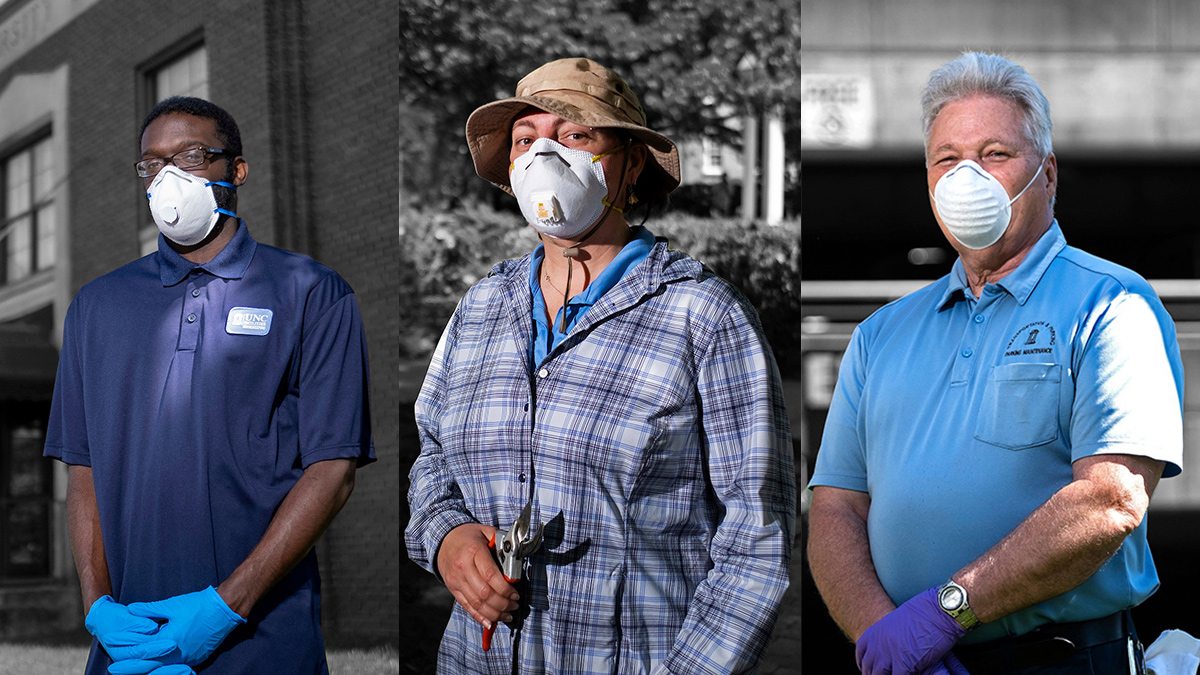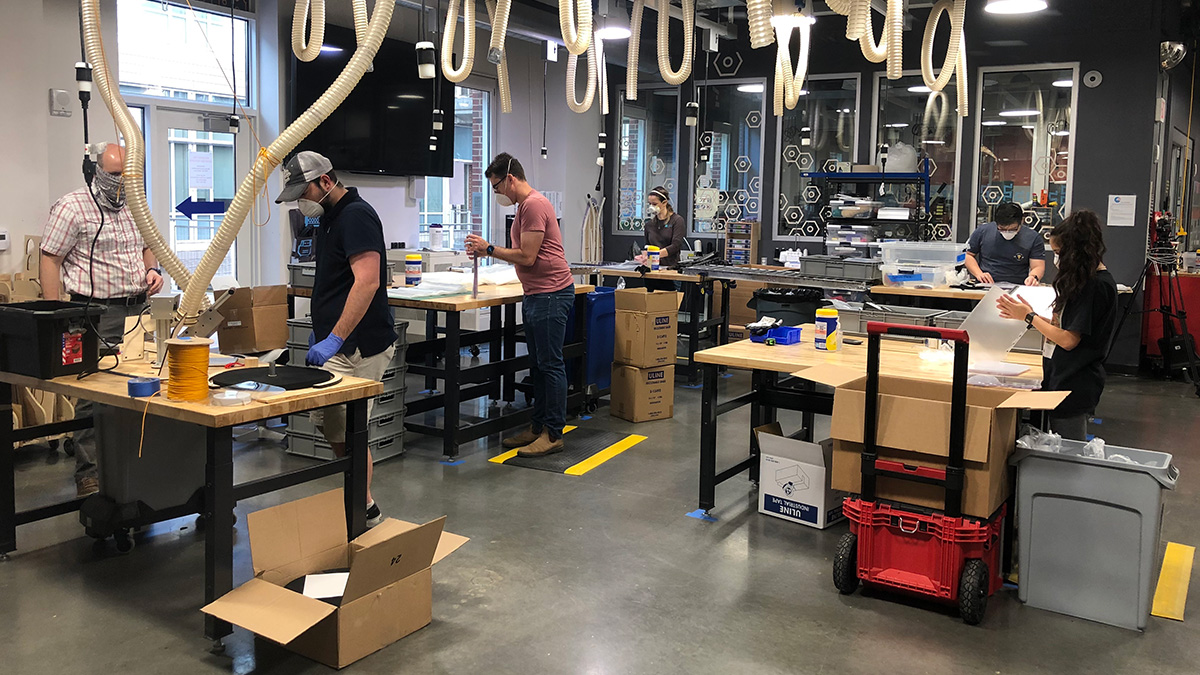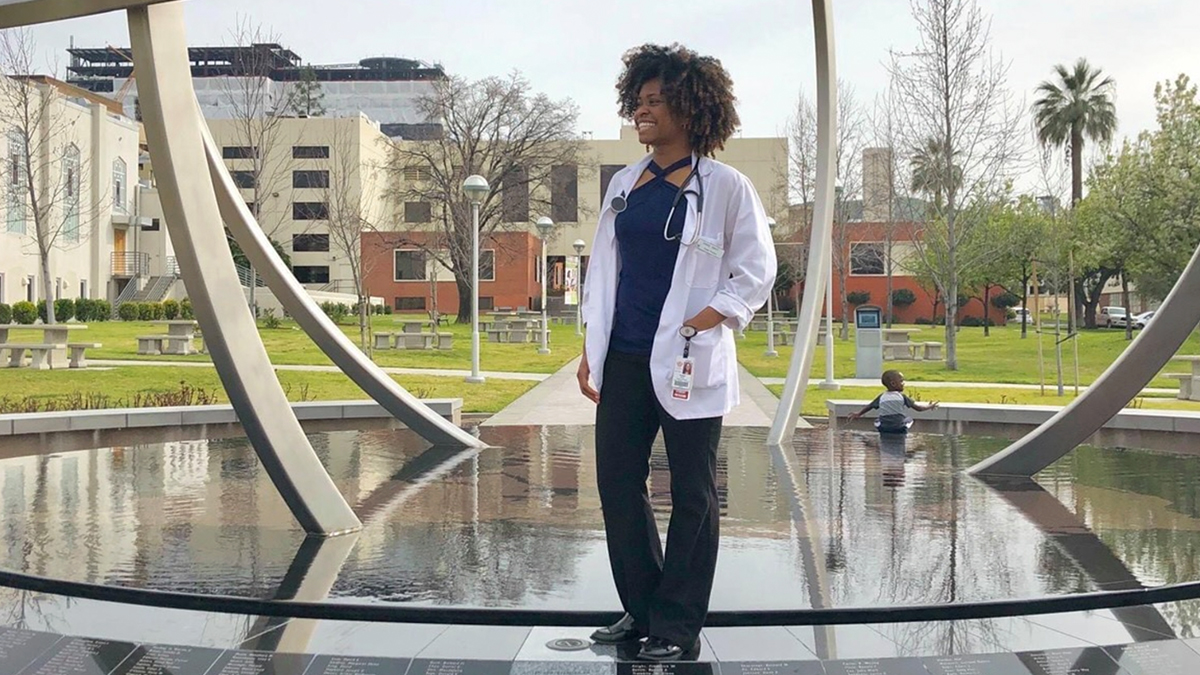Carolina’s heroes
The University salutes its essential workers and asks Tar Heels everywhere to wear Carolina blue to honor them on April 28.

Cleaning clinic floors, sanitizing miles of handrails, maintaining UNC Police vehicles ─ essential workers across campus do these daily tasks and much, much more to keep Carolina operating, many while wearing personal protective equipment on long shifts and making personal sacrifices.
To help recognize essential workers, The Well talked with a few to learn about their days in the time of COVID-19.
 ‘This is strange’
‘This is strange’
Crews from the Department of Transportation and Parking are used to keeping campus parking facilities operating during unusual circumstances such as snowstorms or hurricanes. Now, they focus on protecting employees and visitors. Three- and four-person teams sanitize 10 parking decks daily, paying special attention to those that UNC Health workers and campus visitors use.
“When COVID-19 came along, my director and I had a conversation,” said Adrian Naylor, parking maintenance and construction manager. “We felt it would be important to keep parking decks sanitized, especially stairwells, handrails, elevators and drink machines, and wipe down any surface that somebody might touch.”
Instead of working three shifts as they usually do, crews work one daily shift in masks and gloves from 8 a.m. to 5 p.m. Naylor said that the crews were prepared thanks to annual in-service training on Carolina’s Environment, Health and Safety tests and proper ways to wear personal protective equipment.
“Our normal focus is on maintenance to equipment or lighting,” Naylor said. “Now, our focus is totally on COVID-19. We’re all on one shift during the day so we can see better and have better lighting.”
While they’re sanitizing areas, workers often hear words of appreciation from staff and visitors. Still, the atmosphere feels abnormal.
“We’re a close-knit group, so this is strange to be keeping our distance from each other,” he said. “The campus overall, compared to what we’re used to, is a ghost town. If it wasn’t for medical people coming in and patients and visitors to the hospital, there’s hardly anyone out.”
Naylor said that he is extremely proud of his small crews’ comparatively large amount of work, their resilience and focus. “Having to wear masks and gloves for hours while you’re trying to sanitize everything around you is different. We’re not used to working under those conditions for long periods of time, so it’s amazing to see their attention to detail and awareness of something you wouldn’t normally think about, like cleaning lower rungs on handrails that children hold.”
‘It’s not normal’
Like many workers, Joshua Wilder knew being an essential employee was part of the job when he began working as a Carolina housekeeper in 2017.
Unlike many essential workers on campus who are seeing fewer people around, Wilder works in three fairly busy buildings ─ the Public Safety Building, housekeeping headquarters in the Cheek/Clark Building and UNC Health’s Family Medicine Center, where medical professionals are providing acute care for patients.
Every day, Wilder disinfects each building, paying particular attention to bathrooms and surfaces such as door handles.
“I’m just taking it day by day, taking it slow and protecting myself the ways I was trained on, and wearing my PPE, like gloves and mask, and keeping rags and germicidal spray near me.” Wilder said he wants to protect himself and family members at home.
Wilder said that he’s trying to look at the situation as “all in a day’s work,” but he still knows things aren’t normal.
“It’s a little weird to me because I’ve never seen campus in a setting like this,” he said. “Even during spring break there are still hundreds of kids here. You know it’s not normal when you see people walking around with masks on and the tents set up at the clinics.
“We’re all working to make sure that people are safe and protected on campus from any type of bacteria or viruses. We’ll hopefully get through this one day soon.”
A different rhythm
Angie Tribble keeps her finger on the campus pulse, and she can tell it’s in a different rhythm nowadays. Tribble, a public safety telecommunicator, answers 911 calls and dispatches UNC Police officers.
As an essential worker, Tribble has experienced some changes in her job and in the calls she answers during her shift. Usually, she is one of four telecommunicators stationed in a room, separated from each other by a high console. Now, Tribble and co-workers rotate days off so that only three people are on duty, and they all work from different rooms within the Public Safety Building.
“It gives us greater social distancing,” Tribble said. “Once we moved our computers and put on our headsets, everything is basically the same.”
What’s not the same is the lower volume of calls, particularly ones related to parking on campus. And, with the department’s telephone response plan in effect to lessen face-to-face contact, calls that Tribble would normally handle by dispatching an officer to a location are instead routed to a patrol officer on desk duty.
“Of course, other types of calls require a response at the site, like property damage and accidents,” Tribble said.
Tribble thinks the changes can help flatten the COVID-19 curve, and she recognizes others doing more.
“I give kudos to all the people at the hospital, because they are on the front line, and to our officers because they have face-to-face contact with people that they don’t know,” she said.
Keeping the University moving
Mark Stark and his crew at the University Service Station are focused on keeping mandatory workers and first responders moving.
“Right now, our job is to make sure other essential employees can get around and get their work done,” Stark said. “We maintain all the vehicles that UNC Police drive and even do repairs and provide fuel for the groundskeepers’ equipment, so we work with pretty much the entire range of essential employees.”
Maintaining the University’s fleet of vehicles and motorized equipment means Stark is used to working under emergency circumstances and remaining on campus when students and faculty leave, but he said this is the first time the emergency has mandated how he worked.
“We’re keeping enough people in the station to work on the limited number of vehicles that are brought in, but trying to limit how many of us are in the same room at a time and making sure we’re standing 6 feet apart even when working on the same vehicle,” he said.
Thankfully, most of the requests they’ve received are easily fixed and don’t require a team effort.
“During the COVID-19 pandemic, the most common repair we’ve made is replacing tires or car batteries. We haven’t had any dramatic damage to repair, but it’s everyday maintenance that keeps the University moving,” said Stark.
Despite the uncertainty surrounding when the COVID-19 pandemic will end, Stark already anticipates how the Service Station will help everyone return to campus.
“I’ve been thinking about the number of cars that have been just sitting on campus for weeks now, with no one driving them or even turning over the ignition,” he said. “When all this is over, I have a feeling we’re going to be busy jumping off everyone’s car batteries when they come back.”
Providing consistency in uncertain times
In a time of uncertainty, Payroll Services is ensuring that all University employees have one constant in their lives: a paycheck.
“Our average payroll is 12,000 individuals, most of whom are paid via direct deposit, but we have around 50 employees who still get physical checks,” said Walter Miller, director of Payroll Services. “We are still going to campus every week to place those checks in the mail. We’re dedicated to making sure everyone is paid correctly and in a timely manner.”
Thankfully, as essential employees, Miller and his team were prepared to carry on as usual with limited access to campus.
“We’ve run multiple payrolls remotely because of inclement weather and other adverse events but never for an extended period of time like this,” he said. “It takes a team to make a payroll work, so keeping a sense of coordination and communication has been vital. We have a meeting every day so we’re all on the same page.”
Miller said that he and his team feel a sense of accomplishment in continuing to provide a vital service to the University’s employees.
“When we released the first bi-weekly payroll after the University transitioned to working remotely, it felt like a win to give employees that sense of normalcy and consistency. Everything else may be changing, but your check will arrive exactly when it’s supposed to.”
Caring for an empty campus
Although few people remain on campus, University groundskeeping crew members spend their days keeping campus beautiful for when everyone returns.
“Right now we’re all pitching in wherever we’re needed on campus to maintain the grounds and keep the flower beds and green areas under control for when everyone comes back to campus,” said Krystal King, a groundskeeper who typically works on the University’s rooftop and specialty gardens. “I’ve been trimming limbs and pulling weeds in pretty much every area of campus.”
King said that the groundskeepers were particularly prepared to practice social distancing while working.
“We already wear masks because of the pollen and gloves for gardening, so the biggest change has been riding in separate vehicles across campus and standing 6 feet apart.”
As one of the few groups of essential workers remaining on campus, King and her fellow groundskeepers have noticed an unexpected consequence of campus closing.
“There are so many weeds growing up between the bricks on pathways,” she said. “Usually, pedestrians’ footsteps naturally help control the weeds, but without the students or faculty on campus the weeds started getting out of control. That’s never happened before.”
While King is focused on keeping the weeds and vines on campus under control for the time being, she’s looking forward to grooming campus for everyone’s return.
“The groundskeeping crew is working in smaller teams to limit our contact, so we haven’t had the chance to do any of the extra planting we do every spring: switching out the annuals, putting out fresh mulch and adding new flower beds,” she said. “That’s what I’m looking forward to most when everyone comes back to campus ─ getting to practice creativity as landscapers and add those little touches that make the campus so beautiful.”



